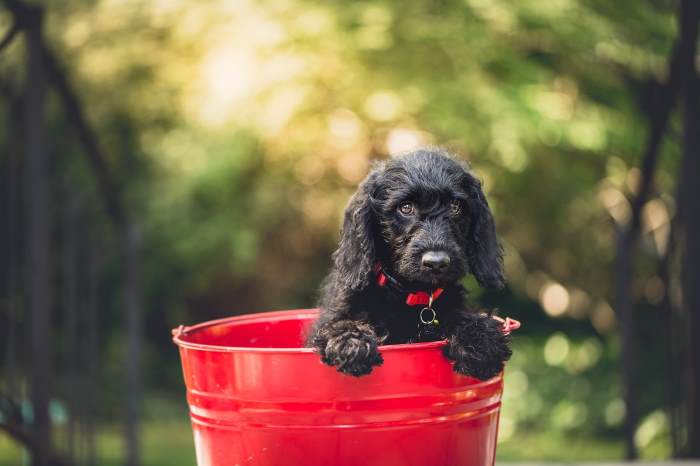- Home
- Getting A New Puppy
- Puppy Mills
How To Avoid Puppy Mills!
Puppy mills, also known as puppy farms, produce puppies en-mass for profit. These so-called breeders have no interest in the breed or welfare of the pups. Conditions are often horrific; the puppies are neglected and often in poor health.
Learn how to avoid puppy mills with these simple steps and tell-tale signs to be aware of to help you identify the breeder you're dealing with is a puppy farmer!
Why You Shouldn't Buy From A Puppy Farm
Before we go on to learn how to avoid puppy mills, let's clarify why you shouldn't buy from puppy mills. I won't keep you long, I promise!
You may not know it, but many puppies bought from these places have serious health issues due to sheer neglect.
Many of these puppies don't even reach the age of six months!
During this time, you are likely to have shelled out considerable amounts of cash on vet bills and endured much sadness and heartache watching the pain and suffering of your little puppy.
 Thankfully, I didn't come from a puppy mill!
Thankfully, I didn't come from a puppy mill!Please don't think that by buying a puppy from one of these farms, you'll be helping to rescue an ill-treated and unhealthy puppy.
Wrong. You are allowing farms like these to thrive and continue their cruel breeding practices.
Following the advice below will help you avoid accidentally buying a puppy born and raised in one of these cruel breeding kennels.
How To Avoid Puppy Mills
Puppy farmers are eager for your money and will take extreme measures to pull the wool over your eyes.
So, how can you be sure you're buying from a responsible breeder?
If You Are To Avoid Puppy Mills Successfully: Be Sure To...
- Visit their premises and check the conditions in which they're breeding. Be suspicious if you see many outbuildings or sheds that could facilitate breeding puppies en mas.
- Ask how many different breeds they raise, and be very wary if they're offering more than two or three types of breeds for sale.
(Some good breeders offer more than one breed, but make sure you check them out.) - Be patient. Good breeders will only breed once or twice a year, and you may need to add your name to the breeder's waiting list. A puppy mill will likely have many puppies available and many different breeds too!
- Ask how many litters they produce a year.
 I'm not sad, honestly!
I'm not sad, honestly!- Always ask to see both parents or, at the very least, the mother. She should look clean, happy and healthy, if not a little tired, which is only natural after giving birth and caring for her puppies.
- Get references. Ask if they'd mind if you spoke to pet owners who've bought puppies from them previously.
- Ask to see the puppy's registration papers and check the details against the breeder's details.
- Ask what their policy is on returning a puppy. A good breeder will always accept a return without question and will re-home the puppy for you.
Puppy Mills: Obvious Warning Signs!
When you arrive at the breeder's premises, look around you. There may be some obvious warning signs that you could be dealing with a puppy farmer, for example:
- The breeder offers many different breeds of puppies.
- The pups are crated or kept elsewhere and brought to you one puppy at a time. You need to see all puppies together (even if most of them are earmarked as sold) to allow you to watch them interact with each other.
- The mother is either very young or looks unkempt and in poor health, indicating that she's not properly cared for and is over-breeding.
- The seller isn't very knowledgeable about Cocker Spaniels.
- The breeder doesn't ask you questions to assess your suitability as an owner for one of their puppies, indicating that money is the main issue.
- Puppy farmers tend not to name their breeding dogs. Warning bells should ring if the mother doesn't seem comfortable around her owner or doesn't seem to recognize her name.
- Be cautious if the breeder recommends or is willing to let the puppy go to their new home before it's eight weeks old. The breeder may save money by letting the pup go early, but its development will suffer.
- If the seller asks you to collect your puppy from anywhere other than their kennels (for example, a shopping mall car park or a service station), refuse. Walk away.
- The same applies if they offer to deliver the puppy to your home. They don't want you to see their premises. Ask yourself why?
Puppy Mills Supply Pet Shops!
Although the puppies may look healthy, you can't be sure where pet shop puppies were bred and born, nor can you be sure of their pedigree.
Puppy mills often supply pet shops with puppies for sale.
Sometimes pet shop pups are bred by inexperienced individuals (back-yard breeders - not to be confused with hobby breeders) who don't have the welfare of the puppies at heart; they only want to make money.
 Peekaboo!
Peekaboo!"The advertisement listing Cocker Spaniel puppies for sale may have been placed by a professional breeder, a puppy farmer, or a pet shop owner - the question is, how will you know which one you're replying to?"
If You're Replying To A Newspaper Advert...
If you're replying to an advert, read it very carefully.
- Does the advert give lots of detail?
- Are the puppies described with love and affection?
- Does the advert confirm the puppies have had worming treatment?
- Have they had their first vaccination?
- Will the puppy be insured, and if so, for how many weeks?
- Is the breeder registered with the Kennel Club, and has the puppy's birth been registered?
- Do they offer a puppy pack and help after the pup leaves the mother?
- Will the puppies be partly socialized?
- Will the breeder sell only to a good home?
- Do they profess to be professional Cocker Spaniel breeders?
Or did the advert simply give the bare facts?
If you decide to answer an advertisement, answer the advert that contains the most information and gives a kind and loving description of the puppies.
Detailed information and a loving description show that the breeder cares greatly about their puppies and is unlikely to let their precious pups go to any Tom, Dick or Harriet.
Alternatives To Buying A Puppy
Consider adopting a rescue dog (or, if you're lucky, a puppy!) from your local Cocker Spaniel rescue centre.
Breeders are often looking for caring homes for their dams when they've reached their breeding limit. If this interests you, you should register your interest with one or two local breeders.
Avoiding Puppy Mills: Conclusion
Vigilance and careful questioning will help separate the puppy farmer from genuine, responsible Cocker Spaniel breeders.
Take your time, ask your questions, and make your assessment. Don't be rushed or 'backed into a corner'.
Never accept a puppy without first seeing where it was born, the mother and its siblings, and if they offer to deliver your puppy, be firm and insist you call to collect it.
If any of this appears to be a problem for them, thank them and move on, you're probably dealing with a puppy mill owner!
You can read more about puppy farms here (including a video of a puppy mill raid in Tennessee).
Here's a link to the ASPCA (American Society for the Prevention of Cruelty to Animals) if you'd like more information on how to avoid buying from puppy mills.
And if you're in the UK, here's a link to the RSPCA (Royal Society for the Prevention of Cruelty to Animals), which explains what they are doing to help put a stop to puppy farms.
Good luck!
How To Eradicate Puppy Mills
I received this letter from one of our visitors. It makes quite a lot of sense, so I posted it here.
How To Make Effective Change
I have been reading and telling the story of shunning puppy mills for 40 years, and they are still with us. Education and awareness will not make them disappear because there are too many unwitting people worldwide.
However, there are hints of ways to make possible changes that will greatly help the situation. The public push for regulation and enforcement has been an important impetus for change, but we need more.
A family member got me a pet shop puppy as a gift when I was going through a very rough time in my life. That is generally an unwise thing to do, but my dog is a gem and did make me feel better.
The pet shop had him well-socialized and kept him clean and exercised. They sold to anyone but required the buyers to fork over several thousand dollars up-front, giving the buyer one year of free vet care at a local clinic and an agreement to neuter.
 What time's dinner Mum?
What time's dinner Mum?I think something like this as a law would go a long way in stopping impulse buys and ensuring proper puppy care and population control.
My puppy came with up-to-date vaccinations because the law required the seller to carry vaccinations and prove them by affixing the inoculation sticker to the paperwork as solid proof.
My family member signed a contract that included a 'waiver' of existing animal welfare laws, such as laws in place that require ensured health or remedy of taking animals back. Such laws should be universal, unable to be waived and strictly enforced by all who sell puppies.
Those selling purebreds with known testable health problems should be required to test the parents for these problems before they can breed from these dogs. They should be required to disclose certification that the parents are clear of such defects or fully disclose any defects.
My puppy came with paperwork that gave the name of the breeder. Sadly I tracked this down and realized it was on the list of 'the horrible hundred' puppy mills. In the past, this puppy mill had a fire that killed an unknown number of animals breeding in a barn. These kennels have been cited in the past for poor conditions and poor animal health.
Thanks to the Inspectors issuing citations with follow-up, some changes have since been made, but there needs to be more accountability.
I found online pictures of what I think were my pup's parents. The mother is sitting in a stain-soaked plywood whelping box/dog house leading to a catwalk with metal chain-link-fence-like flooring.
Some of the cited dogs had blisters on their feet from walking on cage bars. I love my pup very much, but I am saddened to think of its mother living in such conditions and the fate of all his many brothers and sisters.
In the past, I have worked with responsible breeders on top of their litters; they tested for health, were willing to take animals back and let buyers know if an issue developed with the parents or litter mates that might reflect on the pups.
Working with a conscientious breeder who will keep in touch with you and help you train and work with your pet is by far the preferred method.
Thank You
By: Pauline
Website Author and Owner
Hello, You don't give your name, but I would like to thank you for contributing to my page. I wholeheartedly endorse all you say.
Your ideas for eradicating these unsafe and wicked practices are sound, and I would love to see them fulfilled; however, it's not something that you or I can do alone. We need to get more people on board.
Keep telling your story about shunning the puppy mills (and I'll continue to write about them), and who knows, eventually, we may be able to help close many down.
Value of organizations
by: Anonymous
Thank you. I have since learned that the favourable laws and changes I saw were thanks to a hard-fought legal battle by local and national organizations also seeking change.
Photo credits for How To Avoid Puppy Mills:
1. Lilun at http://www.dreamstime.com/stock-photography-family-english-cocker-spaniel-dogs-image23621952
2. Visitor Photo
3. Visitor Photo


